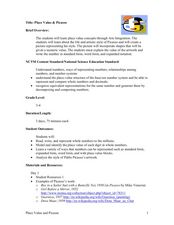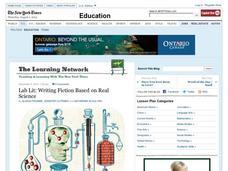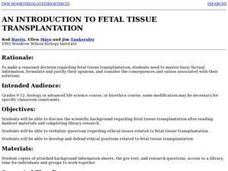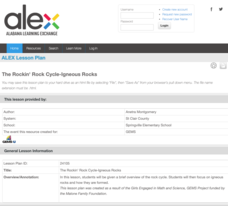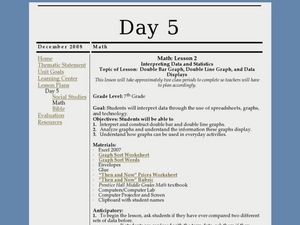Curated OER
Place Value & Picasso
Place value to the millions is the focus of this math lesson. Third and fourth graders investigate multiple ways to represent a number. They examine place value while studying factual information about Pablo Picasso. Resources are provided.
Curated OER
Apple of My Eye
Students study apples. In this apple lesson, students read Apples by Gail Gibbons. Students discover the life cycle of apples and determine the many uses of apples. Students write a list of factual information on strips of construction...
Balanced Assessment
Presidential Popularity
Media often misrepresent data and statistics to their advantage. This lesson asks scholars to analyze an article with misleading statistics. They use margin of error and mean data in their studies. Once they complete their analysis,...
Curated OER
Sounding Off About Impeachment
Help your middle and high schoolers reflect on the responsibility of newspapers to act as a vehicle for 'everyday citizens' to voice their opinions. Then, using an article about the first day of the Senate impeachment trial of President...
The New York Times
Writing Fiction Based on Real Science - NYTimes.com
Refuse to alienate your scientific-minded young scholars during your creative writing unit. Learners explore how literary writing can reflect observable fact, and be based in actual science. The links include examples of fiction and...
Curated OER
News Journalism Across the Media: Introduction
Although students are aware of news as information that influences their perceptions of the world, they are often unaware of the various ways to present that information. Encourage them to investigate, discuss, analyze and make valuable...
National Park Service
A Peace Park
Piece together American and Canadian culture by learning about peace parks! Scholars discuss differences between Waterton Lakes National Park and Glacier National Park as a group. The newly-informed pupils answers questions about this...
Curated OER
Early Explorers
Fifth graders research European explorers. For this world history lesson, 5th graders will compare eight European explorers and identify important factual information about each. Students will be engaged through game-play and...
Curated OER
What is a Biography?
Investigate biographies with your class. Compare autobiographies and biographies of Martin Luther King, Jr. as an example. Learners explore the factual components that make up a biography and locate several biographies of notable...
Curated OER
An Introduction to Fetel Tissue Transplantation
Learners explore fetal tissue transplantation. They research basic factual information and justify their opinions. They write a paper discussing their position. Students consider the consequences and values associated with their...
Curated OER
Food Webs
Students produce a newspaper covering topics related to food webs. They use print and electronic sources to gather information about specific animals. They share their information with the class.
Curated OER
Pandemic Panic
Students gather information about the H1N1 virus, and share this information. For this pandemic lesson students read about Influenza A, or Swine Flu, compile information on the disease, and then present their findings to the class.
Curated OER
The Physics of the Planets: How 16th and 17th Century Physicist Helped Us Understand Our Solar System
Eighth graders draw the paths of the planets in the solar system. In this astronomy lesson, 8th graders calculate speed of objects using distance and time information. They research about the work of scientists in the 16th and 17th century.
Curated OER
Nonpoint Source Pollution in Long Island Sound
Students examine and identify the types of nonpoint pollution on Long Island Sound. In groups, they walk the shoreline, collect trash and identify its source. Using that information, they create a variety of graphs of the different...
Curated OER
Fact or Fiction
Students explore journalism by reading a book in class. In this factual research lesson, students read a portion of a Magic School Bus book and identify parts that seem to be factual and fictional. Students view an episode of the Magic...
Curated OER
Threats to Validity
Students review the components of the scientific habits of mind. In groups, they use this information and relate it to scientific investigations. They develop strategies to evaluate information and evidence and how to question sources...
Curated OER
All About Titan and the Huygens Probe
Young scholars examine the characterisitics of Saturn's largest moon, Titan. They discuss what they think is on Titan and what the Huygens probe can tell them about the moon. They write a summary about the information they gathered...
Curated OER
Hype!
Eight various activities have your learners looking at hype in the media. Advertisements for films, politics, music, and philanthropy all contribute to emotional appeals and marketing strategies trying to convince consumers to...
Alabama Learning Exchange
Levers - Weight Lifters
Students investigate how levers help to lift heavy loads. They view and discuss examples of levers, explore various websites, experiment with the levers brought to the class, and watch the video for the book "Mike Mulligan and His Steam...
Curated OER
Burning Issues
Students study fire management. In this science lesson, students recognize and understand what they think would be the most responsible and appropriate actions to take in regards to fire managment.
Alabama Learning Exchange
The Rockin' Rock Cycle- Igneous Rock
Fifth graders recall prior knowledge about rocks. In this igneous rock lesson, learners work in cooperative groups to perform experiments to classify the properties of igneous rock. They write a detailed paragraph and illustrate the rock...
Curated OER
Interpreting Data and Statistics using Graphs
Seventh graders interpret data. In this lesson on types of graphs, 7th graders construct, interpret, and analyze different graphs. This lesson includes worksheets and resources.
Curated OER
Storytelling In America
Students discuss how Washington Irving is considered an important 19th century-American storyteller. They create their own version of a passage from 'The Legend' after listening to the story.
Curated OER
Ugly? Says Who?
Students explore biology by writing animal poetry in class. In this animal characteristics lesson, students research the Internet for facts about an "ugly" animal such as a bug or small critter. Students complete worksheets about animal...
